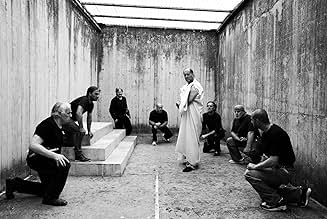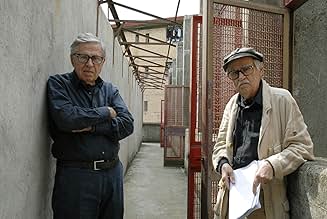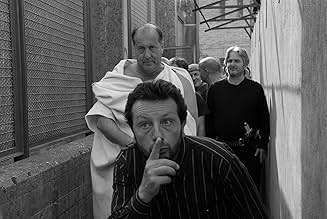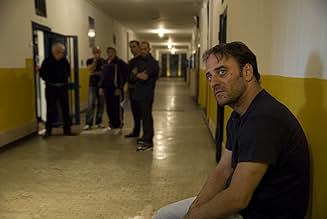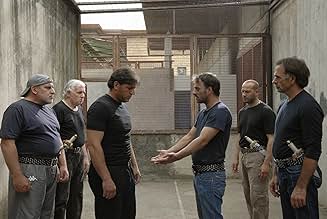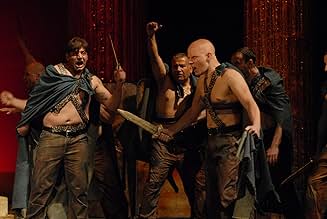IMDb RATING
7.3/10
6.9K
YOUR RATING
Inmates at a high-security prison in Rome prepare for a public performance of Shakespeare's "Julius Caesar."Inmates at a high-security prison in Rome prepare for a public performance of Shakespeare's "Julius Caesar."Inmates at a high-security prison in Rome prepare for a public performance of Shakespeare's "Julius Caesar."
- Directors
- Writers
- Stars
- Awards
- 16 wins & 21 nominations total
- Directors
- Writers
- All cast & crew
- Production, box office & more at IMDbPro
Featured reviews
The concept is very original, giving criminal prisoners the opportunity to produce a Shakespearer play in prison, the plsy being "Julius Caesar", and each prisoner allowed to speak in his own dialect. The result is a very stylistic and primitive alternative Shakespeare, mainly shown by rehearsals, and especially Brutus makes a very good performance. The text is considerably mutilated, only the action scenes are mainly presented, and there is not one woman in the whole performance. Still, it's an interesting representation, like all the films of the brothers Taviani are, and the main credit is the original angle. Most of the film is in black and white, to which the colour sections present a great efficient contrast. The theatre performance turns into a tremendous success, in spite of some arguments among the prisoners.
After attending the premiere of "Cesare Deve Morire", I was not so sure about the movie. It was a good movie, but somehow essayist, rather loose, not catchy. The outstanding performance of Salvatore Striano (Brutus) was striking and rewarded by the audience. The beautiful composition of black and white pictures was of high aesthetic value. It is a very calm movie, the music is nearly minimalistic.
So how come it had a huge impact on me - later? In contrast to most other movies I had seen in Berlin, it was important. Other movies dealt with existentialistic, superficially more important topics than with some prisoners rehearsing a Shakespeare play. Yet "Cesare Deve Morire" had more to say and thus it deserved the Golden Bear. The questions it poses are the same ones as in the Shakespeare play in interrelation with the real destiny of the imprisoned play actors. Even though it is not a particularly spectacular movie, it has the tenor of what makes a strong movie: Importance. The filmmaking is of minor importance, the idea is in the foreground, which is the right decision. The play continues in our minds after the final curtain. Impressive.
So how come it had a huge impact on me - later? In contrast to most other movies I had seen in Berlin, it was important. Other movies dealt with existentialistic, superficially more important topics than with some prisoners rehearsing a Shakespeare play. Yet "Cesare Deve Morire" had more to say and thus it deserved the Golden Bear. The questions it poses are the same ones as in the Shakespeare play in interrelation with the real destiny of the imprisoned play actors. Even though it is not a particularly spectacular movie, it has the tenor of what makes a strong movie: Importance. The filmmaking is of minor importance, the idea is in the foreground, which is the right decision. The play continues in our minds after the final curtain. Impressive.
10ibarradj
I saw this at the Palm Springs Film Festival and was blown away! As soon as the movie began, I could tell it was a movie that I should pay attention.
The plot is a performance of Shakespeare's Julius Caesar by a group of real-life prisoners in an Italian prison. I loved how the prisoners could relate to the play by seeing the parallels in their own lives--the power lust, deceit and betrayal. The more the prisoners understood the play, the more they became immersed in their roles.
There have been many attempts to make Shakespeare palatable to the modern audience. This was my favorite iteration because it showed the actors trying to understand it, just as an audience might try to find the relevance. As a high school student, I found Shakespeare and Roman History boring. It wasn't until I hit my 40s did I realize this history was more violent than the Sopranos.
I don't know if this movie has ever been widely released. I highly recommend seeing it if it ever comes to your town.
The plot is a performance of Shakespeare's Julius Caesar by a group of real-life prisoners in an Italian prison. I loved how the prisoners could relate to the play by seeing the parallels in their own lives--the power lust, deceit and betrayal. The more the prisoners understood the play, the more they became immersed in their roles.
There have been many attempts to make Shakespeare palatable to the modern audience. This was my favorite iteration because it showed the actors trying to understand it, just as an audience might try to find the relevance. As a high school student, I found Shakespeare and Roman History boring. It wasn't until I hit my 40s did I realize this history was more violent than the Sopranos.
I don't know if this movie has ever been widely released. I highly recommend seeing it if it ever comes to your town.
The Shakespearean 'All the world's a stage' gets a new meaning with this very interesting and very different film made by the Taviani brother whose actors and heroes are individuals for which the world is the high security prison where many of them are to spend long years paying for serious crimes. Using theater as a mean of therapy end education happens in some of these prisons, now a film not only dares to make this process known and visible outside the perimeter of the prison, but also tries to make of it a work of art. The Golden Bear at the Film Festival in Berlin is a proof that the Taviani brothers succeeded to convince at least the critics and members of the jury. I get the feeling that the larger public was less convinced - it's a very interesting piece of cinema, but not one of these that attracts audiences in numbers. This is not entertainment.
In one of the introductory scenes we see a screen test. The actors-to-be are asked to introduce themselves in two situations - a 'soft' family one, and a second which demands them to feel constrained and express rage. Each of them acts with a mix of sincerity and intensity that much exceeds and compensates their lack of professionalism. This is the key of the film. We have already seen theater in theater (Shakespeare himself is the first and maybe greatest master of the genre) and theater about prisons, and many of these were already brought to screen. What we have never seen before is the mix of situations which makes the walls of the prison disappear for the ephemeral moments when the words of the ancient drama become the reality of life for the prisoners acting it.
The film asks many questions which arise after the screening ends. Julius Caesar is a play about values - honor, democracy, freedom. How do the prisoners relate to these? The characters of the play are cruel in modern terms, the plot is also about treason and murder - how do these men who have committed serious crimes relate to these deeds? Some of the most interesting moments in the play (and there are only a few of them) are these in which real life (which for the actors is life in prison) interferes in the scenes of the play. I found the smooth, sometimes unobserved, sliding of life in a 21st century prison into the political drama that took place in the first century BC to be terrifying.
And then we have the ending. The show is over, it ends in applause and ovations. Then the actors get back to what is their 'home' - the prison where most of them still have to spend many years. What we do understand is that life cannot go on without such a film changing it. The lives of the special actors in this movie, but to some extent the lives of the spectators as well.
In one of the introductory scenes we see a screen test. The actors-to-be are asked to introduce themselves in two situations - a 'soft' family one, and a second which demands them to feel constrained and express rage. Each of them acts with a mix of sincerity and intensity that much exceeds and compensates their lack of professionalism. This is the key of the film. We have already seen theater in theater (Shakespeare himself is the first and maybe greatest master of the genre) and theater about prisons, and many of these were already brought to screen. What we have never seen before is the mix of situations which makes the walls of the prison disappear for the ephemeral moments when the words of the ancient drama become the reality of life for the prisoners acting it.
The film asks many questions which arise after the screening ends. Julius Caesar is a play about values - honor, democracy, freedom. How do the prisoners relate to these? The characters of the play are cruel in modern terms, the plot is also about treason and murder - how do these men who have committed serious crimes relate to these deeds? Some of the most interesting moments in the play (and there are only a few of them) are these in which real life (which for the actors is life in prison) interferes in the scenes of the play. I found the smooth, sometimes unobserved, sliding of life in a 21st century prison into the political drama that took place in the first century BC to be terrifying.
And then we have the ending. The show is over, it ends in applause and ovations. Then the actors get back to what is their 'home' - the prison where most of them still have to spend many years. What we do understand is that life cannot go on without such a film changing it. The lives of the special actors in this movie, but to some extent the lives of the spectators as well.
It's rather discardable. The directing brothers were frustrated as they tried to create something as interesting as Kaos, Fiorile or Luisa Sanfelice. If this is up to the Golden Berlinese Bear, it's a sign of how low the level of current productions is. This is meta-theatre, set in Rebibbia, a high-security prison in Rome. The performers are real life convicts. "Cesar must die addresses the links between drama and reality , but working with amateurs didn't help. The film may be useful as kinda sociological propaganda, but it never qualifies as 'Cinéma vérité,' the meta-style of fiction-documentation filmmaking developed by Edgar Morin and Jean Rouch, inspired by the former theories about Kino-Pravda. I do call it a kind of Reality Show, though. Aren't Inmates Survivors & Big Brothers who are Keeping Up with the Roman Kardashians after all? ;-)
Did you know
- TriviaPaolo and Vittorio Taviani heard about the prisoners acting program and contacted Fabio Cavalli with the idea of doing Shakespeare's play and shot the whole experience.
- ConnectionsFeatured in Film '72: Episode dated 27 February 2013 (2013)
- How long is Caesar Must Die?Powered by Alexa
Details
Box office
- Gross US & Canada
- $76,908
- Gross worldwide
- $1,567,339
- Runtime1 hour 17 minutes
- Color
- Sound mix
- Aspect ratio
- 1.85 : 1
Contribute to this page
Suggest an edit or add missing content


